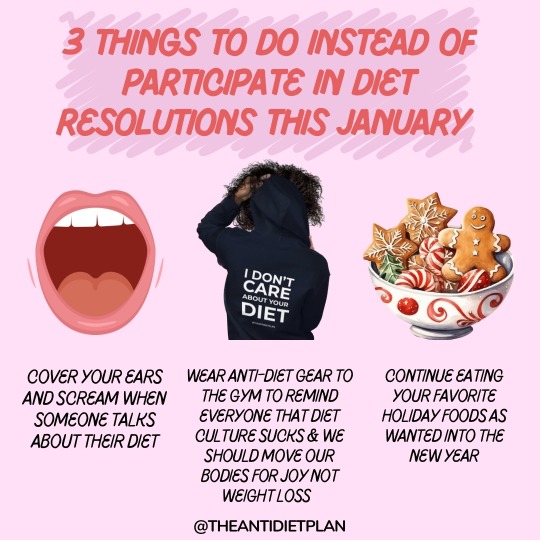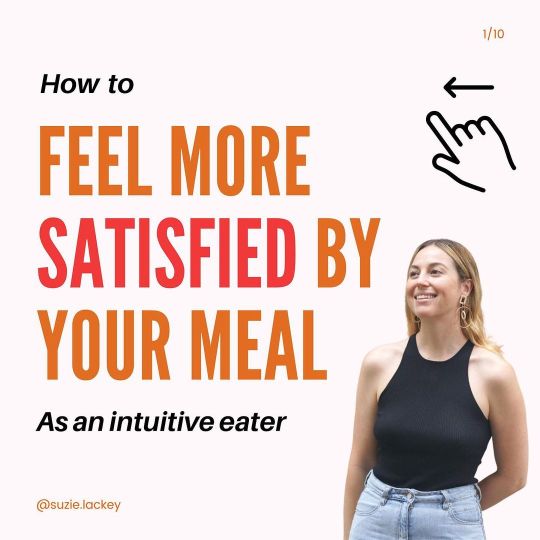#intuitiveeating
Text

theantidietplan
As we start 2024, we are being hit with an onslaught of ‘New Year, New You’ themed messaging that suggests our best self is just around the bend. Whether it is advertisements selling us weight loss programs, coaches touting productivity hacks, or influencers hawking “health” tonics, the message is the same—our current self isn’t enough.
As consumers have become savvy to the fact that diets don’t work, diet companies have tried to obscure their messaging, claiming to be “anti-diet” or “mindful eating” despite promoting plans that involve calorie counting, food restriction, and a focus on weight loss.
Don’t be fooled, if it looks like a diet, sounds like a diet, and tastes like a diet, most likely it is a diet (hint: promises of weight loss are usually a clear giveaway something is a diet). And we all deserve so much more than a lifetime trying to shrink our bodies over and over again. Here’s to 2024 being a year we leave dieting behind and embrace our fullest most authentic selves 🎊🥳🎉🪩
#dietculturedropout#foodfreedom#intuitiveeating#fatpositive#bodypositivity#newyear#newyearsameme#newyearsresolution#newyearsresolutions
11 notes
·
View notes
Text

I have reached the highest weight I have ever been. 154 pounds. The highest I had ever been before this was 137 pounds and that was when I was 9 months pregnant with my son. At 43 years old, I have gotten to a point that I never thought I'd reach. It's hard for me to be honest about how I feel, because I have a tendency to make it all sound positive, especially when people feel the baffling need point out how much weight I've gained. As if I failed to notice.
Sometimes I feel some weird need to blame myself for this weight gain, and in part it is true. Even now, I could eat healthier, I could start an actual exercise regimen. But there have been so many other circumstances that have played a role. Hormones that were and still feel a bit messed up, turning 40, changes in my relationship, and more than anything a lot of stress at work.
I have gotten to a point where I want change, but not in the way that I used to look for change, which was beating myself up completely in order to get gains. Restricting, working myself to the bone, moving in ways I did not like at all.
So I am starting over. All the way over, and I don't even really know where to start.
I can't listen to any more advice from anyone. I am simply turning to myself. Turning inward and listening to my own soul, my own heart, and my own common sense. I know my body better than anyone and I am far from stupid when it comes to nutrition, especially feeding my own body.
I would be lying if I didn't say that I would want to lose 20 pounds. But by saying that it would be a purely emotional reaction. Also, it would purely be for aesthetics.
So every day I will have to remind myself that I am doing this for a different reason. Even if I lose no weight, but feel better and gain muscle back, gain my flexibility back. Most of all to gain back my peace of mind. My joy and my happiness.
-365 yoga and health journey with the Queen of New Beginnings -
3 notes
·
View notes
Text
Lightly salted crispy cucumbers – without the brine and extra hassle

#winniesbalance#dieteticintern#allfoodsfit#balancedeatingrealfood#food52#feedfeed#thefeedfeed#nutrition#healthfood#wholefoods#realfood#buzzfeast#foodblogger#rd2be#makesmewhole#intuitiveeating#foodfreedom#healthy#foodie
6 notes
·
View notes
Text
Stop Dieting, Lose Weight, & Live Happier
youtube
#stressmanagement#relaxation#exercisemotivation#timemanagement#supportsystem#mentalhealthmatters#selfcare#wellness#fitnessmotivation#lifestyle#mindfuleating#intuitiveeating#foodfreedom#mindfulnessmatters#slowdown#listenyourbody#healthylifestyle#eatwithpurpose#healthyliving#wellnesstips#Youtube
3 notes
·
View notes
Photo

Fat is bad, sugar is good. No, wait… fat is good and sugar is bad. If you’re confused it’s not your fault. The diet industry is not interested in your health just your money. The first step to becoming an intuitive eater is to reject the diet mentality. By rejecting diet culture you can finally stop restriction your food choices. Restricting does not work and triggers primal hunger, which can lead to binge eating. If you’re ready to walk away from dieting for good, click the link in my bio to learn how. #intuitiveeating #dietculture #sugar #food #sugarfree #fatfree #diet #antidiet #nutritionalwisdom #vintage #healthcoach #mindbodyeating https://www.instagram.com/p/CnH1FRyO2Dp/?igshid=NGJjMDIxMWI=
#intuitiveeating#dietculture#sugar#food#sugarfree#fatfree#diet#antidiet#nutritionalwisdom#vintage#healthcoach#mindbodyeating
6 notes
·
View notes
Photo

Satisfaction is foundational to intuitive eating. If you eat with the aim of feeling satisfied then your food choices, how much and when you eat will reflect that. But how do you feel satisfied when you eat? These are my 7 tips to help you get there. Only you know what is satisfying for you but these tips can help you tune into that. #intuitiveeating #satisfy #satisfaction #satisfyingfood #lovewhatyoueat #food #mindfuleating #overeating #foodfreedom #nofoodrules https://www.instagram.com/p/ClmuL-KvOTm/?igshid=NGJjMDIxMWI=
#intuitiveeating#satisfy#satisfaction#satisfyingfood#lovewhatyoueat#food#mindfuleating#overeating#foodfreedom#nofoodrules
4 notes
·
View notes
Text
instagram
#Instagram#IntersectionalFeminism#HAES#FuckDietCulture#DietCulture#DietCultureDropOut#feminist#IntuitiveEating#FatPositive#FatAndHappy#FatAndFabulous#FatAndFree#FatPositivity#BodyPositive#AllBodiesAreGoodBodies#EatingDisorderRecovery#EatingDisorder#EatingDisorderAwareness#AllBodiesAreBeautiful#feminism#intersectionality#IntersectionalityMatters#intersectional#SmashThePatriarchy#FreeHealthcare#leftist#EatTheRich
2 notes
·
View notes
Text

You're made up of chemicals and so are the foods you eat and the water (H2O) you drink.
Sure, you could say that a banana is natural because it wasn't made by humans (although it kind of was through selective breeding) but it's still made up of chemicals. Typically when people say something is 'natural' they mean 'without chemicals' and that's not accurate.
If someone is selling you a 'natural' product or food, it's definitely full of chemicals. Regardless of the product.
Also, 'natural' things aren't always 'good', and added chemicals aren't always 'bad'. While I was doing some reading, I found this great article by canadianfoodfocus.org that brought up a good point: E.Coli is natural and can cause severe sickness or death whereas adding synthetic vitamins to foods has helped the population's health in many ways.
Labeling foods as 'natural' is misleading and contributes to moralizing food which is harmful.
In the end, it's pretty amazing that everything is made up of tiny little particles. (can you tell I'm taking science classes at the moment? haha)
#antidiet#antidietculture#nondiet#nondietapproach#haes#healthateverysize#intuitiveeating#dietculture#processedfoods#allfoodsfit#intuitiveatingofficial#fuckdietculture#ditchthediet
6 notes
·
View notes
Photo

Peanut Butter Cookies and the Benefits of Simplicity
Ingredients:
1 cup of peanut butter
1 cup of brown sugar
1 egg
1 tsp of baking soda
Instructions:
Pre-bake your oven to 350 degrees
Mix all your ingredients. You don’t need to stress about the order, it’s not that deep
Scoop out cookies to the size you want. You can use a standard spoon and roll into balls.
Press with a fork to make the classic peanut butter cookie design. Or don’t, it’s fine.
Bake in the oven for 10 minutes, begin checking them around 8 minutes though to see how brown the edges are getting.
This is a recipe that I discovered only a month or so ago, and even though I haven’t made these cookies a bunch of times, all my friends and I have absolutely fallen in love with them. They’re nothing overly special, just your typical savory with a hint of sweet peanut butter cookie, but it’s the few ingredients and ease to make them that really makes them special. Needing only four ingredients and no in depth, treacherous outline on how to mix them together, they’re a cookie you can make late at night when you’re craving something sweet or quickly before a party.
Another thing that’s great about this recipe is that they’re gluten free, and as someone who’s close friends with someone trying to navigate eating at college while living with Celiacs, a sweet and simple treat like this can really brighten someone’s day. Most of the time when my friend tries to eat food at the dining hall, the only thing she can eat with a hint of confidence at not being cross contaminated is French fries, and even the state of those is questionable.
I’m also looking forward to using this recipe with mild modifications if I or someone else in my family needs to undergo radioactive iodine therapy again. Thyroid cancer runs in my family, and one of the best treatments for it is radioactive iodine and repeated testing and scans to monitor the state of your body. In preparation for the treatment, you must avoid all iodine in food, so for this recipe I can use all-natural peanut butter and egg substitute, making something delicious and comforting as I prepare for treatment.
The simplicity of recipes like this are great everyone, even those without dietary restrictions like my friend or myself, because they are without the extra fats, sodium, and preservatives that store bought goods have in them. This makes them all around healthier because you know what’s actually going to be entering your body, especially because you made it yourself!
Trying out recipes like this also teach you more about cooking and baking, like how you can use basic staples in place of other necessary aspects for cooking. For example, in this recipe there is fat (butter, margarine, shortening, oil, etc.) because the peanut butter supplies that, multitasking on taste and texture. This is an example of how you can use healthier pieces involved in your cooking like peanut butter instead of regular butter, adding protein and vitamins in place of empty softeners.
What are some of your own favorite nutritious alternatives to use in baking or cooking? Do you think you’ll try this peanut butter cookie recipe the next time you’re craving some??
2 notes
·
View notes
Text
Bruh I was eating veggie stir fry I ate, I wasn't hungry no more but wasn't full full and could keep eating but swear I was too unmotivated to keep chewing lolol
0 notes
Text
embodyconfidencecoaching
Join us! ❤️🪩
#bodyimage#bodyimagehealing#bodyimageissues#bodydysmorphia#recoveryisbeautiful#ditchdietculture#dietsdontwork#intuitiveeating#intuitiveeatingofficial#youareenough#newyears2024#idontcareaboutyourdiet
2 notes
·
View notes
Text

Women’s Optimum Nutrition: Unlock Peak Wellness
Women’s Optimum Nutrition refers to the specific nutritional needs of women to support their overall health and well-being. It focuses on providing women with the essential vitamins, minerals, and other nutrients that are crucial for their health at different stages of life. Understanding and meeting these nutritional requirements is key to unlocking peak wellness in women’s lives. Read More...
#womensnutrition#womenshealth#womensfitness#nutrition#womenswellness#womenover#healthylifestyle#guthealth#perimenopause#menopause#irritablebowelsyndrome#hormonehealth#nutritionist#fodmaps#nutritionfacts#healthateverysize#dietitian#something#health#intuitiveeating#ibsfriendly#womenssupplements#hormonebalance#proteinpowder#bodyacceptance#bodyrespect#nutritionforwomen#thewellnessshoppingclub#costperformance#womenshealthandwellness
1 note
·
View note
Photo

Nutritional Mindfulness Programs: A Path to Conscious Eating https://rntozen.com/blog/mindfulness/nutritional-mindfulness-programs-a-path-to-conscious-eating/?utm_source=tumblr&utm_medium=RN+To+Zen+Social+Media&utm_campaign=RN+To+Zen+Posts
#BodyPositivity#EatMindfully#FoodAwareness#HealthyLiving#IntuitiveEating#MindfulEating#NoMoreDiets#NutritionalMindfulness#WellnessJourney
0 notes
Text

Blog Talk Starz Psychics Network Radio
Wednesday 7th February 2024 1-2pm EST
Natalie Sist interviews Lisa Masé
Board Certified Nutritionist (BCHN), Registered Health Coach (RHNC), herbalist, and intuitive eating guide who strives to be trauma-informed. She has been a nutrition clinician, somatic practitioner, and educator for fifteen years.
Lisa is trained in the wisdom traditions of European Herbalism, Ayurveda, Macrobiotics, Mindful / Intuitive Eating, and Chinese Five Element Theory to offer a comprehensive, universal view of health. She relates to the world in a non-binary way, prefer she/they pronouns, and welcomes clients who are trans, queer, and/or people of global majority (BIPOC / PoGM).
She is an ally and organizer for the International Food Sovereignty Alliance and collaborates with a consensus-based group to organize and host regional assemblies.
Lisa is certified in Sustainable Food Systems through the University of Vermont and engages in continuing education on Mindful Eating, Mind-Body Healing and Culinary Medicine.
BOOK: The Culinary Pharmacy: Intuitive Eating, Ancestral Healing, and Your Personal Nutrition Plan – December 5, 2023
https://blogtalkradio.com/starzcast
#nataliesist#BlogTalkRadio#BlogTalk#intuitive#intuitiveeating#healingtrauma#certifiednutritionist#nutritionist#herbalist#healthcoach#herbalism#SomaticHealing#somatic#culinarypharmacy#nutritionplan#culinarymedicine#ayurveda#macrobiotics
0 notes
Text
Mindful Eating: Cultivating a Healthy Relationship with Food

In today's fast-paced world, developing a healthy relationship with food has become more important than ever. Mindful eating and intuitive eating are two approaches that can help us cultivate this healthy relationship. By practicing mindfulness and listening to our body's cues, we can make more conscious food choices and foster a positive connection with what we eat. In this blog post, we will explore some tips for cultivating a healthy relationship with food through mindful eating and intuitive eating.

Understanding Mindful Eating
Mindful eating is a practice that involves paying full attention to the experience of eating, without judgment or distraction. It involves being present in the moment, fully engaging with the sensory aspects of food, and being aware of our thoughts, emotions, and physical sensations while eating. The principles of mindful eating include:
- Non-judgmental Awareness: Mindful eating encourages us to observe our thoughts, feelings, and sensations without labeling them as good or bad. It helps us develop a compassionate and non-judgmental attitude towards ourselves and our eating habits.
- Eating with Intention: Mindful eating emphasizes the importance of being intentional about our food choices. It involves considering our body's needs, nutritional value, and personal preferences when selecting and preparing meals.
- Savoring the Moment: Mindful eating encourages us to slow down and savor each bite, fully experiencing the flavors, textures, and aromas of our food. It allows us to appreciate the nourishment and pleasure that food brings.
Practicing mindful eating has numerous benefits for our physical and mental well-being. Some key benefits include:
- Improved Digestion: By paying attention to our body's hunger and fullness cues, mindful eating helps us eat until we are satisfied, preventing overeating and promoting better digestion.
- Weight Management: Mindful eating promotes a healthier relationship with food and reduces impulsive eating, leading to better weight management.
- Enhanced Nutritional Awareness: When we practice mindful eating, we become more attuned to the nutritional value of the foods we consume. This awareness can lead to making healthier food choices and meeting our nutritional needs.
- Reduced Stress and Emotional Eating: Mindful eating encourages us to be present and aware of our emotions and triggers for emotional eating. By recognizing and addressing these emotions, we can reduce stress-related eating behaviors.
- Improved Satisfaction and Enjoyment of Food: By savoring each bite and fully engaging with our food, mindful eating enhances our sensory experience, leading to greater satisfaction and enjoyment of meals.

Mindful eating promotes a healthier relationship with food by shifting our focus from strict rules and restrictions to a more compassionate and intuitive approach. It helps us:
- Tune into Our Body's Needs: Mindful eating encourages us to listen to our body's hunger and fullness cues, allowing us to eat when we are hungry and stop when we are satisfied. This helps us develop a trusting relationship with our body's signals.
- Cultivate Body Acceptance: Mindful eating teaches us to accept and appreciate our bodies as they are, rather than striving for unrealistic ideals. This fosters a positive body image and reduces negative self-talk associated with food and weight.
- Break Free from Emotional Eating Patterns: By being aware of our emotions and addressing them without turning to food for comfort, mindful eating helps us break free from emotional eating patterns and develop healthier coping strategies.
- Foster Mind-Body Connection: Practicing mindful eating strengthens the connection between our mind and body. By being present and attentive during meals, we become more attuned to how different foods make us feel physically and emotionally.
In conclusion, understanding and practicing mindful eating can have profound effects on our physical and mental well-being. By embracing the principles of mindful eating and being fully present in our eating experiences, we can develop a healthier relationship with food, improve our overall well-being, and cultivate a more balanced and enjoyable approach to eating.
Practicing Intuitive Eating
Intuitive eating is a mindful approach to nourishing our bodies that emphasizes listening to our body's natural cues for hunger and fullness. It involves trusting our body's innate wisdom to guide our eating choices rather than relying on external rules or restrictions. By paying attention to our body's signals and honoring its needs, we can develop a healthier relationship with food and promote overall well-being.
Differentiating between emotional cravings and true physical hunger
One crucial aspect of intuitive eating is the ability to differentiate between emotional cravings and true physical hunger. Emotional cravings often arise from non-physical factors such as stress, boredom, or emotional distress, while true physical hunger is a natural physiological response to the body's need for nourishment. Learning to identify the root cause of our cravings can help us make more conscious choices about what and when to eat, leading to a healthier and more balanced relationship with food.
Honoring your body's cravings and preferences
Intuitive eating encourages us to honor our body's cravings and preferences. This means allowing ourselves to enjoy a wide variety of foods without judgment or guilt. Instead of labeling foods as "good" or "bad," we focus on nourishing our bodies with a balance of nutrients while also savoring the foods we love. By giving ourselves permission to eat and enjoy all types of food, we can establish a positive and sustainable relationship with eating.
The role of self-compassion in intuitive eating
Self-compassion plays a significant role in intuitive eating. It involves treating ourselves with kindness, understanding, and acceptance, especially when it comes to our relationship with food and our bodies. Instead of criticizing ourselves for our food choices or body shape, we practice self-compassion by embracing our imperfections and acknowledging that our worth is not determined by our appearance or what we eat. By cultivating self-compassion, we can foster a positive mindset and create a nurturing environment for intuitive eating to thrive.
Tips for Cultivating a Healthy Relationship with Food
A. Be aware of your body's hunger and fullness cues
One of the essential tips for cultivating a healthy relationship with food is being aware of your body's hunger and fullness cues. Paying attention to the physical sensations of hunger and recognizing when you are comfortably full can help you make more mindful choices about when and how much to eat. By tuning in to your body's signals, you can better nourish yourself and avoid overeating or undereating.
B. Practice non-judgmental awareness
Practicing non-judgmental awareness is key to developing a healthy relationship with food. This involves observing your thoughts and feelings around food without criticizing or labeling them as good or bad. By cultivating a non-judgmental mindset, you can reduce guilt and shame associated with eating and make choices that align with your individual needs and preferences.
C. Choose nutrient-dense, whole foods
Opting for nutrient-dense, whole foods is another important aspect of cultivating a healthy relationship with food. These foods provide essential vitamins, minerals, and fiber, supporting overall health and well-being. Focus on incorporating a variety of fruits, vegetables, whole grains, lean proteins, and healthy fats into your meals. By prioritizing nutrient-dense choices, you can nourish your body and promote optimal nutrition.

D. Engage your senses while eating
Engaging your senses while eating is a powerful way to enhance your relationship with food. Take the time to appreciate the colors, textures, and flavors of your meals. Slow down and savor each bite, paying attention to the aroma, taste, and satisfaction it brings. By fully immersing yourself in the sensory experience of eating, you can cultivate a deeper connection with your food and foster a more enjoyable and mindful eating practice.
E. Practice mindful meal planning and preparation
Mindful meal planning and preparation can contribute to a healthy relationship with food. Take the time to plan your meals in advance, considering nutrient balance and variety. When preparing your meals, focus on the process, engage with the ingredients, and appreciate the effort involved. By being present and intentional during meal planning and preparation, you can foster a positive and mindful connection to the food you consume.
F. Emphasize the importance of self-care and stress reduction
Prioritizing self-care and stress reduction is crucial for cultivating a healthy relationship with food. Stress can often lead to emotional eating or mindless food choices. Engage in activities that promote relaxation and self-care, such as exercise, meditation, or spending time with loved ones. By managing stress levels and nourishing your overall well-being, you can develop a more balanced and positive approach to food.

Remember, cultivating a healthy relationship with food takes time and practice. Be patient with yourself, embrace self-compassion, and celebrate the progress you make along the way.
Overcoming Challenges in Mindful and Intuitive Eating
A. Dealing with societal and cultural influences on eating habits
Dealing with societal and cultural influences on eating habits can pose challenges to mindful and intuitive eating. However, there are strategies that can help individuals navigate these influences and make choices that align with their health goals and values.
- Educate yourself: Take the time to educate yourself about the impact of societal and cultural influences on eating habits. Understanding the reasons behind certain food choices or eating behaviors can help you make informed decisions and challenge societal norms that may not align with your goals.
- Challenge food myths and diet culture: Be critical of societal messages about food and body image. Question the myths and beliefs that promote restrictive or unhealthy eating patterns. Surround yourself with positive and supportive influences that encourage a healthy relationship with food.
- Seek support: Connect with like-minded individuals who are also on a journey towards mindful and intuitive eating. Join support groups or online communities where you can share experiences, exchange tips, and find encouragement. Having a support network can help you navigate societal and cultural pressures and stay motivated.

B. Addressing emotional eating and stress-related food choices
Emotional eating and stress-related food choices can be challenging to overcome when trying to practice mindful and intuitive eating. However, there are strategies that can help individuals address these behaviors and develop healthier coping mechanisms.
- Increase self-awareness: Pay attention to your emotions and triggers that lead to emotional eating or stress-related food choices. Practice self-reflection and identify alternative ways to cope with emotions, such as journaling, talking to a friend, or engaging in stress-reducing activities like exercise or meditation.
- Develop alternative coping strategies: Explore non-food-related activities that provide comfort or stress relief. Find healthy outlets for emotions, such as engaging in hobbies, practicing self-care, or seeking professional help if needed. Building a toolbox of alternative coping strategies can help reduce reliance on food for emotional support.
- Create a supportive environment: Surround yourself with a supportive environment that promotes healthy coping mechanisms. Communicate your goals and challenges to your loved ones, so they can provide encouragement and understanding. Remove or minimize triggers in your environment that may lead to emotional eating, such as keeping unhealthy snacks out of sight.
C. Navigating social situations and peer pressure
Navigating social situations and peer pressure can be difficult when trying to practice mindful and intuitive eating. However, there are strategies that can help individuals stay true to their goals and make choices that align with their values.
- Communicate your goals: Clearly communicate your goals and values to your friends and family. Let them know that you are committed to a healthy relationship with food and ask for their support. Having open and honest conversations can help educate others and reduce the pressure to conform to unhealthy eating habits.
- Plan ahead: Before attending social events or gatherings, plan ahead by thinking about the food options available and how they align with your goals. Consider bringing a dish or snack that you enjoy and that fits your dietary preferences. By being prepared, you can ensure that you have options that support your mindful and intuitive eating practices.
- Focus on connection, not just food: Shift the focus of social gatherings from solely food-centered activities to other forms of connection and enjoyment. Engage in meaningful conversations, participate in activities, or suggest non-food-related outings with friends and family. By emphasizing the social aspect rather than solely focusing on food, you can navigate social situations with less pressure and more enjoyment.
Remember, overcoming challenges in mindful and intuitive eating is a journey that requires patience and self-compassion. Be kind to yourself, celebrate small victories, and seek support when needed.
Mindful Eating and Long-Term Health
A. The link between mindful eating and weight management
Mindful eating has been found to have a positive impact on weight management. By practicing mindful eating, individuals can develop a greater awareness of their eating behaviors and make more conscious choices about what and how much they eat. This can help prevent overeating and promote healthier eating habits, ultimately leading to weight management.
B. Mindful eating as a tool for preventing chronic diseases
Mindful eating is not only beneficial for weight management but also plays a role in preventing chronic diseases. By paying attention to the body's hunger and fullness cues, individuals can avoid mindless eating and make healthier food choices. This can help reduce the risk of developing chronic diseases such as obesity, type 2 diabetes, and cardiovascular diseases. The adoption of healthy dietary patterns, including plant-based foods and sustainable practices, aligns with concerns about the environmental impact of the global food system.
C. The role of mindful eating in promoting sustainable and eco-friendly food choices
Mindful eating also promotes sustainable and eco-friendly food choices. Healthy dietary patterns, which emphasize plant-based foods and sustainable practices, not only reduce the risk of chronic diseases but also contribute to lower greenhouse gas emissions and lower environmental impact. By being mindful of the environmental consequences of our food choices, individuals can make more sustainable and eco-friendly decisions, benefiting both personal health and the planet.

Overall, the practice of mindful eating has significant implications for long-term health. It is linked to weight management, serves as a tool for preventing chronic diseases, and promotes sustainable and eco-friendly food choices. It is important for health professionals to encourage and support individuals in adopting mindful eating practices to enhance their overall well-being and contribute to a healthier and more sustainable future.
Conclusion
Cultivating a healthy relationship with food through mindful eating and intuitive eating is a journey that requires practice and self-awareness. By adopting these approaches, individuals can develop a positive and balanced approach to eating, promoting long-term health and well-being.
Mindful eating encourages individuals to be present and fully aware of their eating experiences. It involves paying attention to physical hunger and fullness cues, as well as the taste, texture, and satisfaction derived from food. By tuning into our body's cues, we can make more informed choices about what and how much to eat, leading to a healthier relationship with food.
Intuitive eating goes beyond just eating mindfully. It encourages individuals to trust their body's signals, honor their hunger and fullness, and let go of restrictive dieting rules. This approach promotes self-acceptance and body positivity, fostering a healthier and more enjoyable relationship with food.
Cultivating a healthy relationship with food through mindful eating and intuitive eating has numerous benefits. It can help with weight management by preventing overeating and promoting healthier food choices. Additionally, it has been associated with a lower risk of chronic diseases such as obesity, type 2 diabetes, and cardiovascular diseases. By adopting a mindful and intuitive approach to eating, individuals can make sustainable and eco-friendly food choices, contributing to both personal health and the health of the planet.
Read the full article
#chronicdiseases#eco-friendlyfoodchoices#healthyrelationshipwithfoods#intuitiveeating#mindfuleating#weightmanagement
0 notes
Text

Mindful Eating for Seniors: : A Guide to Help Seniors Live Healthier and Longer
Food is essential for maintaining live on earth. Most humans have the ability to eat foods that are rich in health sustaining nutrients and macronutrients, yet in most societies we fall very short in maintaining a diet that can not only decrease diseases, but help people live healthier an happier lives.
Mindful eating is a practice that involves paying attention to the experience of eating and drinking, both inside and outside the body. For seniors, mindful eating can be especially beneficial as it helps to maintain a healthy relationship with food, improve digestion, enhance the enjoyment of meals, can improve cognitive and emotional decline as well as help seniors live longer and healthier lives.
Order Now: https://cutt.ly/ywAk6IcB
#kindle#bookstagram#amazon#books#kindleunlimited#ebook#book#booklover#reading#mindfuleating#mindfulness#intuitiveeating#healthylifestyle#healthyeating#nutrition#healthyfood#weightloss#foodfreedom#emotionaleating#selfcare#selflove#health#plantbased
0 notes